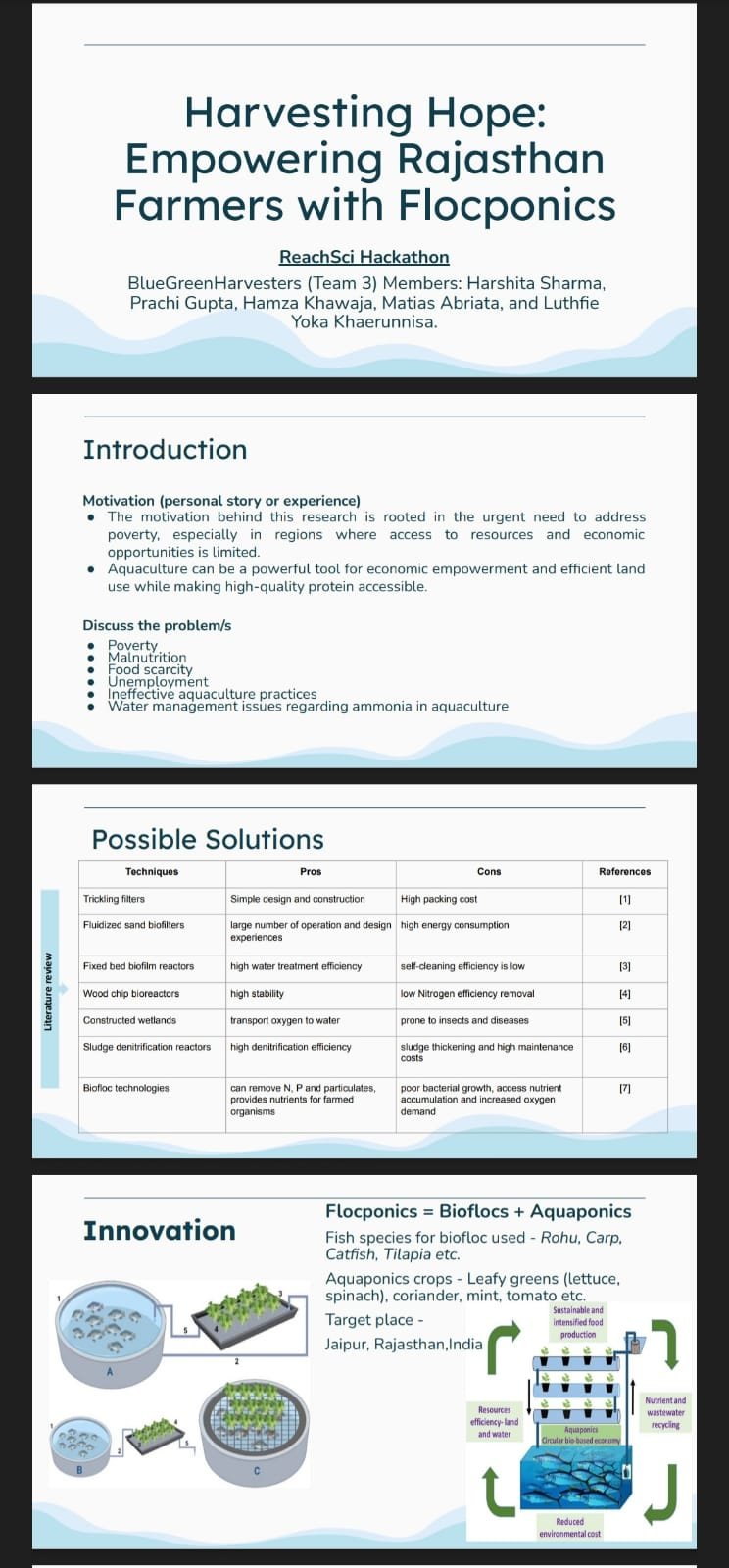
Unlocking Innovation to Tackle Global Challenges: Recap of the ReachSci Virtual Hackathon 23
Content Writer: David Nanna (Marketing & PR Team PR Content Writer)
Proofreading: Isabella (DEC Team Proofreader)
Article Editing: Azza Jedidi (Marketing & PR Team Coordinator) &
Fatima Zahrae Azouz (DEC Team Director)
In an effort to combat poverty and malnutrition through innovative means, ReachSci Society at Cambridge University hosted the Global ReachInnovation Virtual Hackathon ‘23 from October 21st to October 28th. This virtual event aimed to empower participants with the skills needed to make a meaningful impact on these pressing global issues.
Why it Matters: Tackling Poverty and Malnutrition
Highlighting the significance of the hackathon, it's crucial to recognize the staggering global statistics on poverty and malnutrition. The World Bank's poverty line, revised to $1.90 per day in 2015, underscores the pressing need to address the basic necessities for millions worldwide. Malnutrition, affecting 462 million underweight individuals and 1.9 billion overweight adults, further emphasizes the urgency for innovative solutions.
The Journey Unfolds
Highlighting the significance of the hackathon, it's crucial to recognize the staggering global statistics on poverty and malnutrition. The World Bank's poverty line, revised to $1.90 per day in 2015, underscores the pressing need to address the basic necessities for millions worldwide. Malnutrition, affecting 462 million underweight individuals and 1.9 billion overweight adults, further emphasizes the urgency for innovative solutions.
The Journey Unfolds
The eight-day virtual hackathon journey kicked off with participants delving into innovation research, design thinking, market research, and model canvas. Interpersonal skills, teamwork, leadership, and professionalism took center stage on day one. Scientific skills development, including literature review and funding understanding, followed suit, setting the groundwork for participants.
Sessions Overview
Day two saw innovators discussing ideas and honing new skills for team activities, fostering collaboration and creativity. ReachSci advisors played a crucial role on day three, offering feedback, guiding strategy discussions, and encouraging market research. Days four and five continued with discussions and refining presentations, gearing participants up for the grand finale.
The Finale: Celebrating Innovation
Out of over two hundred applicants, seventy persevered to compete for the top honors: Gold, Silver, and Bronze. These winners, chosen from diverse academic backgrounds, embarked on a journey to combat poverty and malnutrition using innovative approaches. The top three winners, Prachi Gupta, Ghina Aria Mardiyah, and Mohamed Ben Hsin, expressed their gratitude and shared their transformative experiences.
Meet the Winning Teams and Their Impactful Projects
Team 1:
Flocponics
The first-winning team, comprising Luthfie Yoka Khaerunnisa, Prachi Gupta, Arshita Sharma, and Hamza Khawaja, presented Flocponics—a groundbreaking blend of Bioflocs and Aquaponics. Focused on Jaipur, India, their project utilizes biofloc technology for fish species like Rohu, Carp, Catfish, and Tilapia. Aquaponics integrates the cultivation of leafy greens, coriander, mint, and tomatoes. By referencing studies on nitrifying trickling filters and biofilter bacterial communities, the team ensures the sustainability and efficiency of their system, contributing to both aquaculture and agriculture.
Team 2:
AEZ-GrowWise
Hailing from Indonesia, the diverse team of Ririn Siti Rahmatillah, Shani Amalia, Badriah Nursakinah, Sharon Brigidte Noya, Wening Rahayu, and Ragil Handito emerged as Gold winners. Their project, AEZ-GrowWise, employs Artificial Intelligence (AI) and Internet of Things (IoT) to combat malnutrition, monoculture, and poverty. The innovative initiative utilizes AI to identify agro-ecological zones and community nutritional needs, generating recommendations for sustainable agriculture. IoT integration allows real-time application of AI-derived recommendations, enhancing the impact on agriculture and fisheries. This holistic approach addresses local ecological potential, contributing to the fight against hunger and malnutrition.
Team 3:
SeedSustainPro
Hailing from Tunisia and Saudi Arabia, Mohamed Ben Hsin, Rania Slimen, Hanan Alquraish, Amal Sallem, and Chedli Damak formed the SeedSustainPro team. Their winning project introduces a mobile application designed to revolutionize agriculture. The app features an online store for original Tunisian seeds, a learning system for farmers, a free seeds exchange platform, and a groundbreaking "Smart Soil Analysis" service. The latter provides farmers with expert insights into soil quality and optimization. Drawing on references from climate risks in food production to smartphone app-based soil structure analysis, SeedSustainPro addresses key challenges in agriculture with innovative solutions.
Voices of the Winners: A Glimpse into the Impact
Postgraduate in Chemistry and Gold winner, Prachi Gupta, expressed her excitement, stating, "I can't believe we won. We learned so much during this one-week hackathon." Similarly, bronze winner Ghina Aria Mardiyah, with a degree in Animal Husbandry, described the experience as eye-opening, highlighting the diverse collaboration that transcended geographical boundaries.
Mohamed Ben Hsin, a team member securing third place, thanked Dr. Mohammed Alawami for the incredible experience, urging others to join the ReachSci journey.
The Broader Impact: Beyond Winners and Awards
Beyond the winners' podium, the hackathon created a platform for participants to develop innovative plans backed by data. Ghina Aria Mardiyah, in her reflection, stressed the wealth of knowledge gained in just one week, emphasizing the importance of collaboration across diverse time zones.
A Week of Learning, Collaboration, and Impact
The ReachInnovation Virtual Hackathon ‘23 stands as a testament to the power of collective innovation. Participants not only competed for awards but, more importantly, contributed to tangible solutions for global challenges. As these innovative ideas unfold over the next three to six months, the impact of this hackathon will continue to resonate in the ongoing fight against poverty and malnutrition.
References
1990: The World Bank defined extreme poverty as people living on $1 or less a day. Around 1.89 billion people, or nearly 36% of the world’s population, lived in extreme poverty. Nearly half the population in developing countries lived on less than $1.25 a day.
World Bank. FAQs: Global Poverty Line Update. Sep 30, 2015. Available at: http://www.worldbank.org/en/topic/poverty/brief/global-poverty-line-faq





